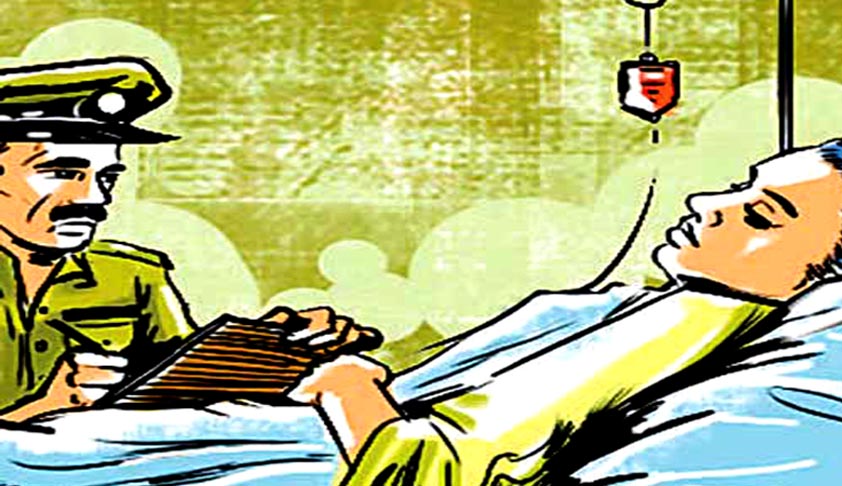Dying declaration in writing when issued by Executive Magistrate without any pressure, the written dying declaration holds a much higher evidentiary value than the oral dying declaration. A single-judge bench comprising of Justice Arvind Singh Chandel adjudicating in the matter of Sanjay Sahu v. State of Chhatisgarh (CRIMINAL APPEAL No.222 of 2021)
In the present case, the Appellant was convicted under section 306 of IPC and was granted Rigorous Imprisonment for 3 years and a fine of Rs.2,000/-. The Appellant and deceased marriage was solemnized 3 years before the death of the deceased. After 1 year of marriage, cruelty was inflicted upon the deceased by her husband and mother-in-law. 1 week before the incident the Deceased (Mainabai) left her matrimonial and went to her paternal house and narrated the entire about the disputes she was facing in her matrimonial house. Thereafter the family members of the Appellant brought her back to their matrimonial home, but on 06.06.1999 another dispute took place between the couple, and the deceased poured kerosene on herself and set herself on fire. She was immediately taken to the District hospital in Durg and again to sector-9 Hospital, Bhilai for better treatment but she succumbed to death due to her injuries on 11.06.1999.
Based on the written complaint and the complaint lodged by the deceased’s father, the police filed an FIR against the Appellant and was implicated of the charges. The Appellant denied the guilt and pleaded innocence. He stated that there was a cordial relationship between the couple and her death was accidental. The trial court acquitted the mother-in-law and sentenced the Appellant under the charges.
The Appellant in this appeal has argued that the order of conviction passed against him was passed without sufficient evidence and also argued that the prosecution has suppressed the dying declaration which says that the incident was accidental and did not submit it along with the charge-sheet. He also asserts that the statement made by the parents of the deceased based on oral dying declaration is a weak evidence whereas a written dying declaration possesses a much higher evidentiary value and also when the written dying declaration was issued by the Executive Magistrate, the deceased was under no coercion. And hence the findings of the Trial court are not in accordance with the law and even if the deceased committed suicide there was no evidentiary record to show that Mainabai was instigated or abetted to commit suicide as defined under Section 107 of the Indian Penal Code. The Respondent denied all the claims of the Appellant and controverted that the conviction was strictly in accordance with the law. It cannot be said that the document was suppressed by the prosecution and the Appellant cannot gain any benefit out of this.
The court relied upon Gangula Mohan Reddy v. State of Andhra Pradesh, M. Mohan v. State & Samadhan Khudaka Koli case and upon a prudent consideration of all the evidence, witnesses, and minute details of the present case, the court concluded that both sides presented evidence regarding the dying declaration were contradictory to each other. The Declaration recorded by the Executive Magistrate was made under no pressure and since the magistrate and according to the prosecution witnesses have stated that when they had gone to the District Hospital to see the deceased, at that time, the deceased had given an oral dying declaration that while taking tea a dispute had taken place with the Appellant and due to quarrels being taken and she being beaten daily she got harassed and poured kerosene on her and set herself on fire. According to the case of the prosecution, the deceased died on 11.6.1999, and one day before, i.e., on 10.6.1999, the father of the deceased made a written complaint and in such complaint, no fact is mentioned that the deceased has made any such statements before the Prosecution witnesses. But the contents in written dying declarations cannot be ruled out.
The court also stated that” material ingredients of the offence under Section 306 of the Indian Penal Code are missing in this case because from the evidence of the prosecution itself it is well established that there was cordial relation between the Appellant and the deceased till 1 year from their marriage. Till that time, there was no complaint by the deceased.” Also the parents of the deceased stated that the quarrels usually takes place in every houses and, therefore, they did not make any complaint. From the statements of the parents , “it also appears that whenever the father of the deceased visited the matrimonial house of the deceased, he was given proper respect there and on all those occasions, the deceased never made any complaint of her being subjection to ill-treatment or marpeet with her. Moreover, immediately after the incident, the Appellant took the deceased to the District Hospital, Durg and thereafter for better treatment he took her to Sector-9 Hospital, Bhilai. There is no evidence on record to show that the Appellant had been continuously ill-treating the deceased or committing marpeet with her or subjecting her to harassment. Therefore, material ingredient of the offence, i.e., instigation as defined under Section 107 of the Indian Penal Code is missing in this case. Thus, the finding of the Trial Court is not in accordance with law and the evidence available on record. The Appellant is entitled to get benefit of doubt.”
Hence, looking upon the above observations, the court granted the appeal and the lower court’s judgment is set aside.


